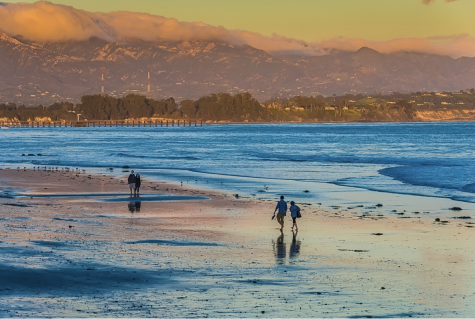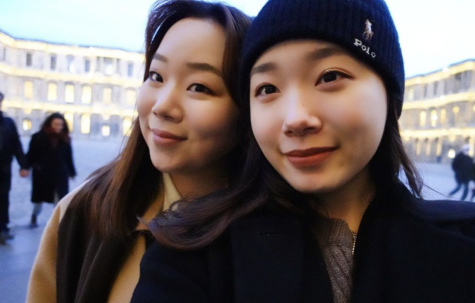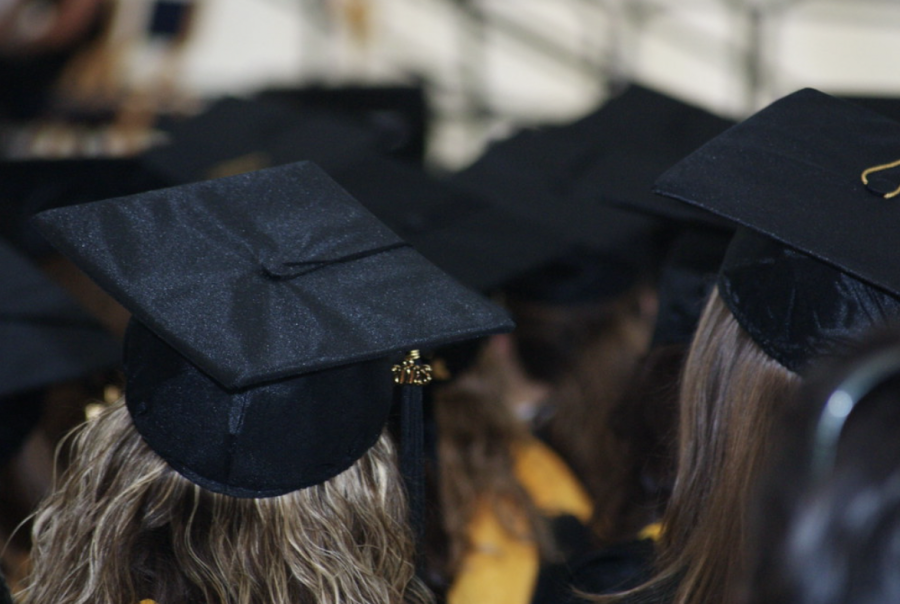Exploring different paths after high school
Students and alumni describe how the unique routes they took for college changed them
April 10, 2022
A student wear a graduation cap and gown at her high school graduation. Licensed under Creative Commons
As seniors reach the end of their high school years, many are in conflict about what to do after high school. From attending community college to going to a college and transferring out, to taking a gap year, each route after high school brings unique benefits and drawbacks.
Community college
When senior Diya Sarin’s parents brought up the prospect of going to community college after high school her freshman year, she “didn’t take it too seriously” at first. It was a route most high schoolers from MVHS wouldn’t even consider, especially as early as freshman year, and jumping into something like that was a big decision. But a year later, she started considering what it could mean for her: Getting into the competitive psychology program at UCLA straight out of high school would be very difficult, and paying for four years of UCLA plus the schooling required to earn her masters or doctorate would prove to be expensive. Going to community college for two years and then transferring to UCLA would not only make the process easier, but would also save two years worth of UC tuition — over $37,000 a year.
As time passed, Sarin grew increasingly confident in her decision as she considered the benefits of going to community college.
“I feel like it’ll allow me to be more independent in the sense of, ‘I have people surrounding me, my family is going to be there,’” Sarin said. “But I will be doing things on my own. And if I need help, I have them, but it’s my own initiative that’s making me do things on my own. I’ll be motivating myself rather than being thrown into the situation and forcing myself to manage myself alone.”
Although her parents initially brought up the idea, they still grew hesitant of this decision at times. According to Sarin, they wanted to make sure she was still pushing herself in high school even though she would be going to community college afterwards. But Sarin says her confidence in her decision eased her parent’s reluctant nature, as they eventually said, “If you think this is the best route for you, just go for it.”
“I’ve been thinking about it for a long time — it’s been two years since I made the decision,” Sarin said. “It’s pretty uncommon for a lot of people to make a choice of what they want to pursue as well as how they want to go about it that early, because I did it in sophomore year. But I feel like because of how long I’ve made that decision for, I’m pretty confident in it now.”
Next year, Sarin will be attending Los Positas Community College, a school that is close to where her parents will be moving and also offers courses that feed into the TAP Program at UCLA — a program which offers California residents taking community college classes “priority consideration for admission to the college.” She claims that because she knows what she wants for her future, it doesn’t matter what path she takes to get there.
“It’s honestly to each their own,” Sarin said. “Some people feel like the only way to go about [schooling] is to do a four year college and figure it out as they go. It was different for me because I was so confident in what I wanted to do as a career from such an early age, so it doesn’t really matter how I get there in terms of schooling. I know what I want to do in life so the [beginning part] of the path is not that important to me.”
College transfer
When MVHS ‘19 alum Ashika Jaiswal chose to attend UC Riverside (UCR) in her senior year of high school, she had no idea she would be transferring out a couple of years later. Out of her top options in high school (SJSU and UCR), she felt that UCR had the stronger Biology program, her preferred major at the time. This combined with the fact that “going to a UC is really emphasized at Monta Vista” led to Jaiswal committing to UCR with no initial intention of transferring.
But after starting college, Jaiswal felt embarrassed, believing the “prestige” of UC Riverside, was lower than that of many of the colleges her friends ended up attending. Her feelings of humiliation influenced her happiness at the school, and led to her “hating [her] time” there during the first quarter. During winter quarter, however, Jaiswal noticed certain things that made UCR an appealing option to her — the campus was nice, the administration seemed to genuinely care about its students and research and internship opportunities were abundant. These factors, which she hadn’t noticed before due to her mental block of prestige and embarrassment, made her “really like” the college. But when COVID-19 hit the U.S. and colleges shut down nationwide, Jaiswal ended up spending a year and a half at home, not once returning to her college campus.
With all the free time, Jaiswal started looking into the opportunities that other colleges had to offer, and began thinking about how she fit in at UC Riverside.
“While Riverside is a great place, it wasn’t the best fit for me personally,” Jaiswal said. “I remember in high school, college counselors and everyone would be like, ‘Think about the fit. Don’t just think about prestige.’ And I realized that the location of [UCR] didn’t really work for me. It worked for a lot of people, a lot of my friends are really happy there. But for me personally, I just felt very disconnected from the campus itself, and so during the pandemic, I went through the process of transferring.”
Jaiswal applied to all the UC schools except UC Merced and UC Santa Cruz, citing that staying in California was important to her and the UC application was pretty straightforward — the UCs just felt like the “right decision.” Ultimately, her choices came down to UC San Diego and UC Santa Barbara (UCSB), and she chose UCSB due to its Economics program.
“I’ve visited [UCSB] a lot because when I was a freshman in college, my friends would [go to Santa Barbara], so I would come every weekend,” Jaiswal said. “I always felt like it clicked better with me. And in terms of the program, it has a really good Economics program, which is more focused on what I want to do. San Diego’s program was so much more math focused, and it seemed not to be the best fit for me. Program-wise, I felt like I belonged at Santa Barbara, and also location-wise, it’s at the beach.”

Despite her excitement for UCSB, Jaiswal concedes that there were parts of the transfer process that proved to be difficult for her. To her, the transfer process was very reminiscent of the college application process from high school, and she was scared to “put [herself] out there” due to her bad experiences with rejections during the high school application process. Additionally, she had to spend a lot of time reflecting on how she had grown during her time at college — a concept that many transfer essay prompts focused on — and she grew nostalgic thinking about the friends and opportunities that she would leave behind at UC Riverside. But after she was accepted into UC Santa Barbara, she says the decision to attend was “really easy.”
“When I was at Riverside, one of the things that I really focused on was trying to find opportunities for myself,” Jaiswal said. “Riverside [is] a really great school, it’s up and coming with a lot of different opportunities. So while I was leaving those opportunities behind, I looked at Santa Barbara, and I already have alumni connections, networking, things that really matter in terms of getting a career, and it logically felt like the best step. So even though I was leaving behind research, I was going to a school that I felt suited me, and I had the opportunities to get into different clubs that align more with what I want to do in the future.”
Despite making a lot of friends and connections and being around impressive opportunities at UC Riverside, Jaiswal doesn’t recommend going through the transfer process like she did, citing that transferring from a university is much harder than from a community college. She says that the monetary cost of a college like UCR is not worth it if “you’re going to a school with the goal of trying to get out of it.”
“If you really want to transfer to another school, you have way better opportunities doing it from CC and doing TAG,” Jaiswal said. “I know it feels like ‘Oh, everyone’s gonna make fun of me if I’m going to CC.’ I currently live with five girls who came from CC, and they are all equally as smart, equally as driven, equally as hardworking as me. I think that’s my one regret — during the pandemic, I wish that I went to CC instead of continuing and paying that UC tuition.”
Gap year
After the fifth article that MVHS Alum ‘20 Hannah Lee’s sister sent her about all the things she could possibly do by taking a gap year — this one about swimming with the sea turtles — Lee left her on read once again, still not convinced that it would be the right choice for her. Despite all the programs and opportunities that taking a year off could yield, Lee was scared about being set back a year at Stanford, the school she had committed to. She feared that “everything would be misaligned,” and wasn’t ready to ignore the “societal pressure that after high school [it immediately] should be college.” Until the very end of July 2020, Lee was prepared to make the leap from high school to college, following the “normal” path that so many of her friends would go on.
But in July, as the start of the Stanford school year neared and Lee started actually imagining herself at the school, she grew nervous about the prospect of being thrown back into a fast-paced academic environment, similar to her high school experience. With the added factor of tuition — $80,000 a year — which didn’t decrease despite Stanford having remote learning at the time due to COVID-19, Lee spontaneously made the decision to take a gap year.
“Even to this day, I’m surprised at myself that I made that decision,” Lee said. “I was feeling so nervous about the fact that there was one month left, and I was like, ‘Oh God, I really have to go to school. I really have to start college, and I still feel like I’m a high schooler, and I’m not ready for that. I’ve just done so much school., I’m a little burned out.’ I guess that was the point where I was like, ‘Whatever. Let’s go for it.’”
Lee says that although the deadline to take a gap year had passed, she expressed how much she “needed a gap year,” and luckily was allowed to take one. She didn’t have any definite plans for how she would spend the year, maybe watching TV at home or traveling, but she knew she wasn’t ready for college just yet. But at the end of September, the “stars aligned” for Lee when the CEO of Collab Asia, a company managing media platforms for content creators, reached out with the offer of an internship after seeing her background working in K-Pop. And a month later, she was on a flight to Korea.
For the next few months, Lee managed YouTube channels for K-Pop artists and groups and came up with marketing strategies. She later worked more closely with these artists, meeting with CEOs of various companies and pitching marketing plans about how to expand K-Pop to different audiences. After her time in Korea, she completed an immersion program in Spain where she had the opportunity to “refresh [her] AP Spanish skills” and then completed her gap year with a vacation in Paris.

However, she says that if given the opportunity to do it again, there are some things she would have done differently.
“One thing I regret about my gap year is taking a gap year and then not spending time on myself,” Lee said. “Especially towards the beginning of my gap year, I basically just worked and I was super stressed all the time. I never made any time for myself. I kind of wish I took maybe three months in the middle to do nothing, and I think it’s really hard to do nothing especially after spending so much time grinding. It’s still something I’m trying to practice. But if you take a gap year, take some time to do nothing, because high school is so stressful. It’s so much of go, go go, and you don’t realize it until you finish and you’re just burned out. I do think it’s important to just be.”
After spending so much time being independent and strengthening her skills as an entrepreneur, Lee explains that after her gap year, she was reluctant to be confined to a classroom and grades at college. But after a “really long period of convincing” from her parents, Lee agreed to give Stanford a try, and realized that her gap year and newfound independence had given her clarification on how she wanted to approach her future in college.
“[I’m] not necessarily as focused on the stereotypical mindset of ‘I have to study this. I have to remember this for a test. I have to pass the class,’” Lee said. “I will admit it’s very, very hard to break out of [that mindset], but I have been trying to make my experience here more like meeting new people, making connections [and] socializing. And also taking more risks, so dropping classes when I’m not interested in them, switching majors, things like that.”
Even though Lee says she finds some of the classes that she needs to fulfill her major requirements “unnecessary,” she doesn’t regret her decision to return to Stanford because of all the people she’s met. These people, she says, “really make the experience,” and the eagerness that everyone on campus shared at the start of the school year means that Lee didn’t feel a separation from them despite having taken a gap year. She also found that she fit in academically, because the study culture she had developed at MVHS carried over to her time at Stanford, making her experience with handling academic rigor easier. Because of the skills and knowledge Lee developed over her gap year, and the seamless transition back into academic life, she urges MVHS students to seriously consider taking a gap year.
“I know what it feels like to be in that position,” Lee said. “I also told myself, ‘Don’t take a gap year. You’re going to be behind. All of your plans are going to fall apart.’ And there’s also this conception that if you take a gap year, you’re not following society’s footsteps. But in my experience, it just really helped me to mature a lot [and] learn things I didn’t learn in school. If life and people were verbs, I would say it helped me to life and it helped me to people, and I think that was really valuable, especially with coming to school and learning to socialize and make connections and deal with adult things. Obviously, [coming to school] is really hard, and it’s really stressful. But I think it’s very worth taking a break and kind of rewinding because you really do deserve it.”

